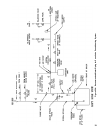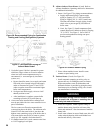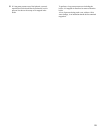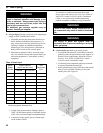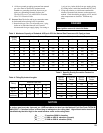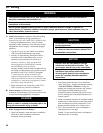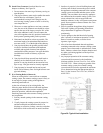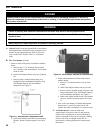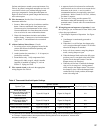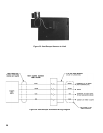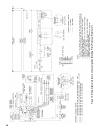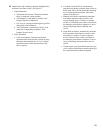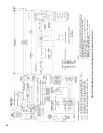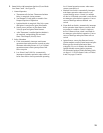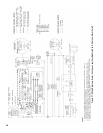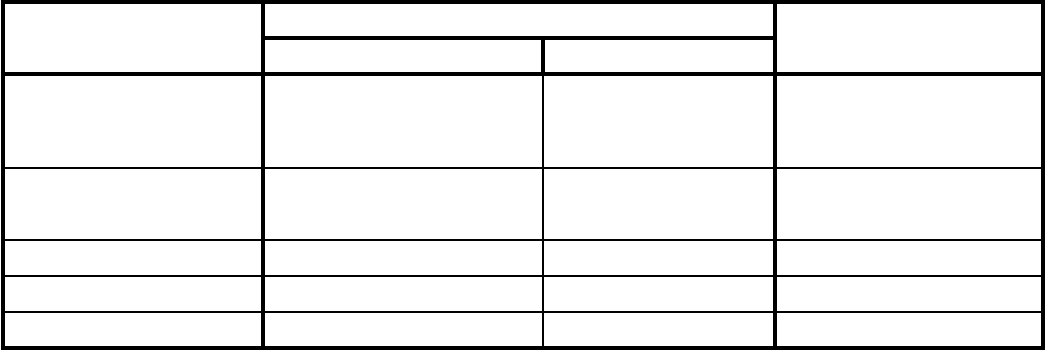
27
Table 6: Thermostat Heat Anticipator Settings
Set heat anticipator to match system requirements. See
Table 6. In general, setting heat anticipator too low will
cause boiler to short cycle without bringing heated
space up to temperature. Setting heat anticipator too
high will allow boiler to operate longer than necessary
and overheat space.
D. Wire thermostat. Provide Class II circuit between
thermostat and boiler.
1. Steam or Water with gravity circulation or tankless
heater. Remove transformer from junction box.
Connect one wire from thermostat to blue wire(s).
Connect additional wire from thermostat to brown
wire or red wire for water with tankless heater.
2. Water with intermittent circulation and without
tankless heater. Connect one wire from thermostat
to Terminal "T" and additional wire to terminal
"TV".
E. Alliance Indirect Water Heater (if used).
1. For wiring refer to wiring diagrams located in this
section and Alliance Installation Operating and
Service Instructions.
2. Attach junction box extension (4 - 11/16 square) to
junction box on boiler.
3. Steam Boilers only. Verify temperature limit
(Honeywell L4006 or equal, which is installer
supplied) is installed in Tapping "P", refer to
Section V: Piping and Trim.
F. Wire control circuit as shown in the appropriate
wiring diagram. See Table 6.
1. A separate electrical circuit must be run from the
main electrical service with an over-current device/
disconnect in the circuit. A service switch is
recommended and may be required by some local
jurisdictions. Boiler is rated for 120 VAC, 60 hertz,
less than 12 amperes.
2. For zone valve wiring, provide separate 24V
transformer rather than attempting to use boiler
mounted control. Consult zone valve manufacturer
for assistance.
G. Wiring diagram and sequence of operation. Locate
the system type you are interested in from Table 6, then
refer to the page indicated.
1.
Vent Damper Sequence of Operation. See Figure
34.
a. Vent Damper is continuously powered at
Terminal 1.
b. When there is a call for heat, the damper relay
coil is energized through Terminal 5 if all limits
ahead of the damper are satised.
c. Relay coil closes contacts, energizing damper
motor, causing damper to open.
d. When the damper blade reaches the fully open
position, power is sent back to the boiler limit/
ignition circuit through Terminal 2 and the
damper motor is de-energized.
e. When the call for heat is satised, the damper
relay coil is de-energized—closing contacts
which energize the damper motor. This causes
the damper to close. When the damper blade
reaches the fully closed position, the damper
motor is de-energized.
System Type
Ignition System
Heat Anticipator Setting (1)
Continuous (Standing Pilot) Intermittent (EI)
Steam with Probe
(McDonnell & Miller PS-802 or
Hydrolevel CGB-400)
Low Water Cutoff
Figure 35, Page 30 Figure 36, Page 32 0.8
Steam with Float
(McDonnell & Miller 67)
Low Water Cutoff
Figure 37, Page 34 Figure 38, Page 36 0.8
Water (Intermittent Circulation) Figure 39, Page 38 Figure 40, Page 40 0.3
Water (Gravity Circulation) Figure 41, Page 42 Figure 42, Page 44 0.3
Water with Tankless Heater Figure 43, Page 46 Figure 44, Page 48 0.6
(1) If system tends to overheat above thermostat's temperature setting, reduce heat anticipator setting by 0.1
or 0.2 amps. If system tends to shortcycle without reaching desired room temperature, increase heat
anticipator setting by 0.1 or 0.2 amps.



